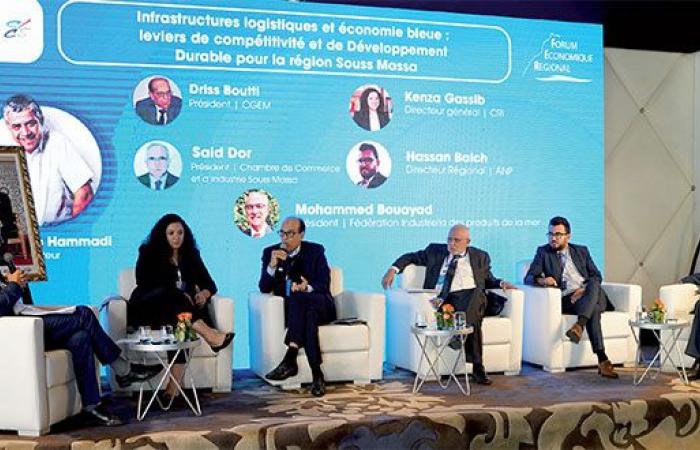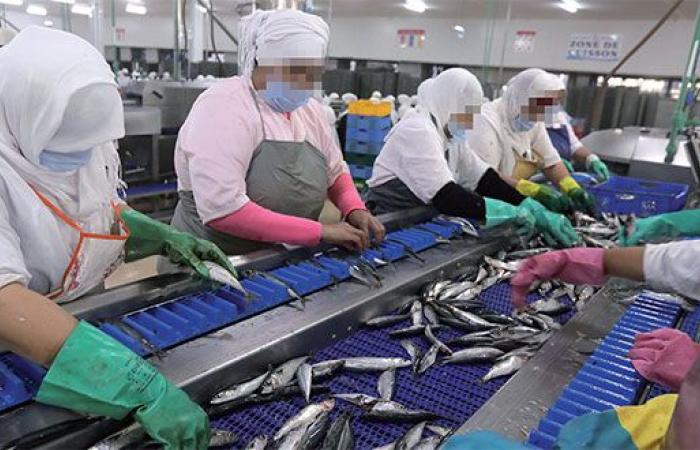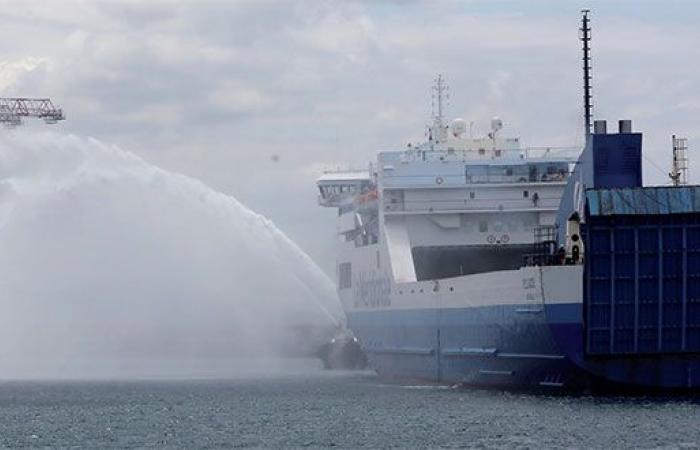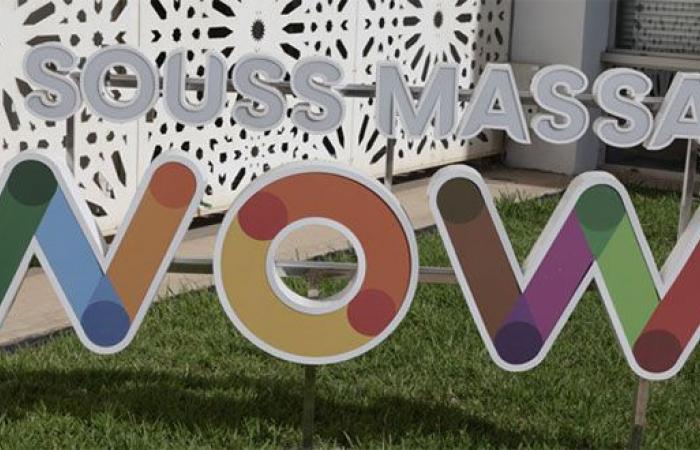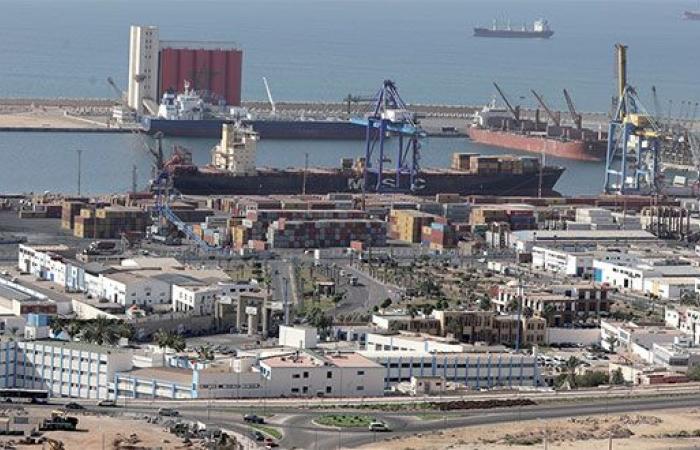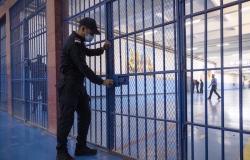Beyond its tourism, its agriculture, its fisheries wealth… the strength of the Souss Massa region also lies in its blue economy, a new lever of economic competitiveness and sustainability.
To decipher the challenges and potential of the blue economy, the Regional Economic Forum devoted an entire panel to this central theme. Hosted and moderated by journalist Chaïb Hammadi, this panel allowed us to review the opportunities offered by logistics and the ecosystems of the blue economy.
Debunking the concept
From the outset, Saïd Dor, in his capacity as president of the Chamber of Commerce and Services, wanted to demystify the notion of the blue economy, the sectors of activity that revolve around it, the opportunities created or even the chain of value.
“When we talk about the blue economy, there is first of all the wealth of our country across a coastline of 3,500 km and 180 km for the Souss Massa region. This is an extraordinary wealth offered by the ocean and which can constitute an engine of economic development. Multiple areas of activity revolve around this type of economy. At their head, fish wealth/fish, fishing as well as all the industries that can result from fish wealth. There is also aquaculture, tourism, yachting and even the integration of the blue economy in logistics. But who says blue economy, also says respect for nature and a certain number of conditions. Among these conditions, logistics that meet the requirements of this economy where most of the production is perishable. This requires the establishment of cold chains in compliance with international norms and standards. There is also, according to the president of the Souss Massa Chamber of Commerce, a whole rigid regulatory arsenal which includes the ecological dimension, the environmental aspect… All against the backdrop of a clear vision and strategies in order to transform the wealth of the blue economy into an engine of development and a lever of growth.
Many interconnected sectors
According to Mohamed Bouayad, consultant and advisor to the National Fishing Federation, in the broad sense of the term, the blue economy concerns all activities and sectors that have a direct relationship with the sea. Obviously, in this ecosystem, many sectors are interconnected such as seaside, maritime and cultural tourism, in addition to fishing and aquaculture.
All these activities have a common objective, that of maximizing resources and their protection, creating value and economic growth, creating jobs or improving the social status of all those who have a relationship with the Wed. The fact remains that maximizing and protecting resources requires minimizing all negative impacts on the environment and on fisheries resources, insists expert and consultant Mohamed Bouayad. In other words, the common denominator of all these activities is economic but with sustainability taken into account. “Otherwise the blue economy will have no meaning.”
From economic to social including the environment
However, the observation today is that there is “overexploitation of resources in the Agadir region where a plethora of deep-sea, coastal and artisanal fishing boats operate”, regrets the expert Bouayad
As for artisanal fishing, it has a very old and obsolete fleet with an average age of more than 34 years and a very low economy at sea. What it does is that they fish near the coasts and small fish. Result: these juveniles never grow and will not reproduce.
It is therefore necessary today to review these activities with a view to modernizing the fleets and reducing overexploitation as well as the fishing effort on the resource. “That’s sustainability. But that’s not all. Sustainability extends to the fisherman’s income, his comfort at sea, the means of navigation and protection on the high seas. It’s a whole. To summarize, sustainability ranges from economic to social to environmental. There is therefore no blue economy without sustainability. insists the consultant.
Logistics: Agadir-Dakar in 48 hours
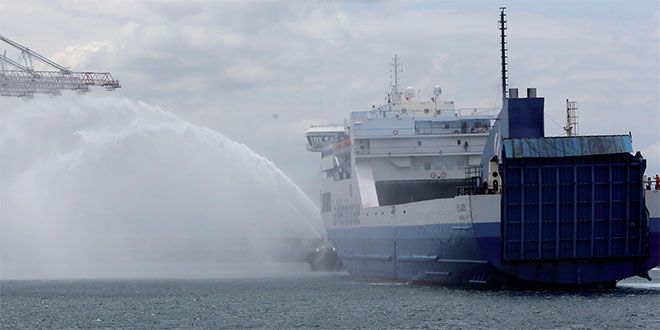
According to Driss Boutti, president of CGEM Agadir Souss Massa, “the blue economy intersects with other economies and sectors of activity, such as the green economy, the solidarity economy, associations, cooperatives. But logistics are very important in this coastal economy.”
Today, according to the president of CGEM Agadir, the opening of maritime lines is a necessity since the container does not work: “Because a container which must go from Agadir to Dakar or Abidjan, it must go through Tanger Med then Algeciras and return. It takes 45-65 days. And as most of Souss Massa’s exportable supply is perishable, we cannot afford to keep the goods in the containers for 2 months before delivery. According to Boutti, today even transport by truck poses a certain number of problems. In particular the multiple border points to cross, the risk of accident, insecurity, the El Guergarate point, Mauritania…
The solution therefore comes from the creation of maritime lines which transport RO-RO trucks with drivers, from Agadir to Dakar, or even beyond. (see also page 5). From the beginning of January 2025, the Agadir-Dakar maritime line will therefore be operational. This will allow trucks to arrive quickly in Dakar, to cross the Sahel countries (Burkina Faso, Chad, Mali, Mauritania…) The Agadir-Dakar crossing will be done in 52 hours instead of 65 days via Tanger Med and Al Gesiras.
80 projects approved for 2.5 billion DH of investments
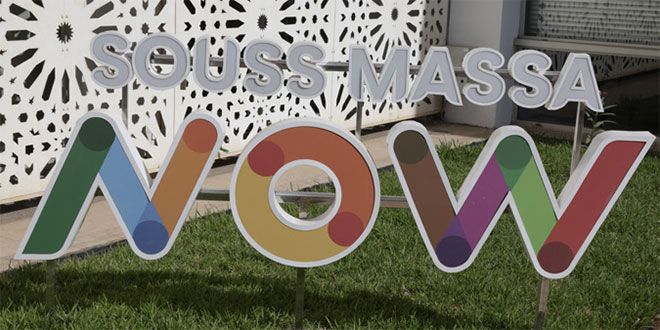
According to Kenza Gassib, CEO of CRI Agadir Souss Massa, in 2024, the Unified Regional Investment Commission has completed more than 80 projects related to the blue economy. Which represents more than 2.5 billion DH of investments. These projects will enable the creation of more than 4,600 jobs. “Which shows the dynamics of the region in terms of project attractiveness in the blue economy.” The general director wanted to recall the missions assigned to the CRI of Agadir Souss Massa which consists of supporting investors in their projects at the regional level. “We also provide monitoring from A to Z to entrepreneurs and project leaders, in order to help them carry out their projects in the best conditions.”
Another important mission dedicated to promoting the region to potential investors, whether Moroccan or foreign, and even to the diaspora of Moroccans around the world (MDM). “The challenge of these promotional actions is to show all the potential and assets of the region to make it the preferred destination for investors”.
A port connected with more than 20 countries
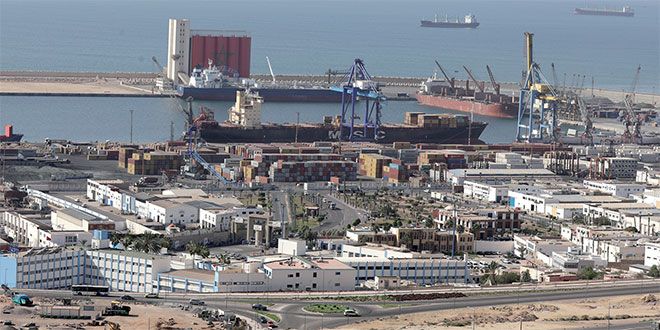
«Le The port sector is governed by Law 02. The Ministry of Equipment is the sovereign authority which oversees the organization and planning of new port infrastructure. Furthermore, the entire regulatory aspect is devolved to the Ministry of Equipment. immediately explains Hassan Baïch, director of the port of Agadir at the National Ports Agency (ANP).
Then there are the port authorities, notably the National Ports Agency (ANP), which are responsible for managing the ports with a certain number of missions such as the allocation of concessions, management of the public domain, development ports. Without forgetting the handling operators, Marsa Maroc in this case as well as other companies. To strengthen the port’s infrastructure and meet high demand, the Port Authority (ANP) has entered into a partnership with the region’s council. This will also improve attractiveness and connectivity. “Today, the port is connected with more than 20 countries. Recently, with all the stakeholders, notably the CGEM, the Chamber of Commerce, the CRI, the region, under the aegis of the Wali, we succeeded in developing a new maritime line with Africa.underlines the young manager of the port, Hassan Baïch.
A.R.

